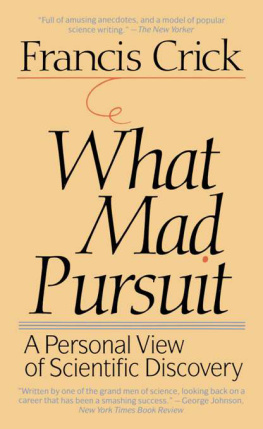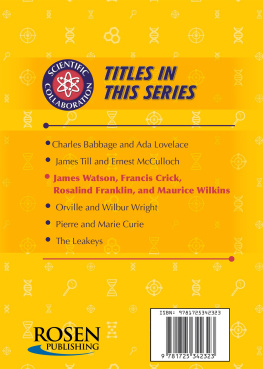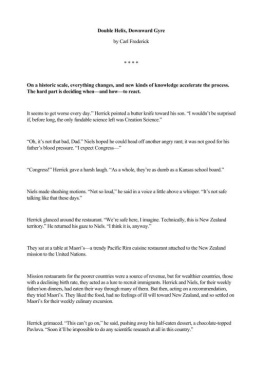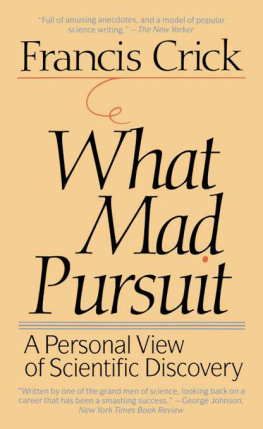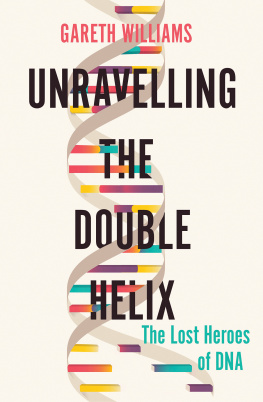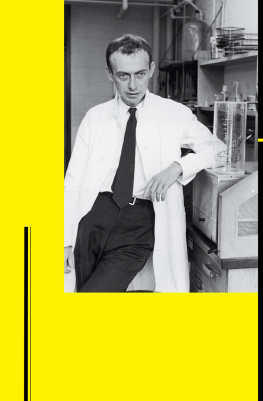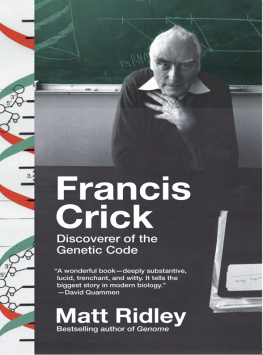Francis Crick - What Mad Pursuit: A Personal View of Scientific Discovery
Here you can read online Francis Crick - What Mad Pursuit: A Personal View of Scientific Discovery full text of the book (entire story) in english for free. Download pdf and epub, get meaning, cover and reviews about this ebook. year: 1990, publisher: Basic Books, genre: Religion. Description of the work, (preface) as well as reviews are available. Best literature library LitArk.com created for fans of good reading and offers a wide selection of genres:
Romance novel
Science fiction
Adventure
Detective
Science
History
Home and family
Prose
Art
Politics
Computer
Non-fiction
Religion
Business
Children
Humor
Choose a favorite category and find really read worthwhile books. Enjoy immersion in the world of imagination, feel the emotions of the characters or learn something new for yourself, make an fascinating discovery.
- Book:What Mad Pursuit: A Personal View of Scientific Discovery
- Author:
- Publisher:Basic Books
- Genre:
- Year:1990
- Rating:5 / 5
- Favourites:Add to favourites
- Your mark:
- 100
- 1
- 2
- 3
- 4
- 5
What Mad Pursuit: A Personal View of Scientific Discovery: summary, description and annotation
We offer to read an annotation, description, summary or preface (depends on what the author of the book "What Mad Pursuit: A Personal View of Scientific Discovery" wrote himself). If you haven't found the necessary information about the book — write in the comments, we will try to find it.
Francis Crick: author's other books
Who wrote What Mad Pursuit: A Personal View of Scientific Discovery? Find out the surname, the name of the author of the book and a list of all author's works by series.
What Mad Pursuit: A Personal View of Scientific Discovery — read online for free the complete book (whole text) full work
Below is the text of the book, divided by pages. System saving the place of the last page read, allows you to conveniently read the book "What Mad Pursuit: A Personal View of Scientific Discovery" online for free, without having to search again every time where you left off. Put a bookmark, and you can go to the page where you finished reading at any time.
Font size:
Interval:
Bookmark:
BOOKS IN THE ALFRED P. SLOAN FOUNDATION SERIES
Disturbing the Universe by Freeman Dyson
Advice to a Young Scientist by Peter Medawar
The Youngest Science by Lewis Thomas
Haphazard Reality by Hendrik B. G. Casimir
In Search of Mind by Jerome Bruner
A Slot Machine, a Broken Test Tube by S. E. Luria
Enigmas of Chance by Mark Kac
Rabi: Scientist and Citizen by John Rigden
Alvarez: Adventures of a Physicist by Luis W. Alvarez
Making Weapons, Talking Peace by Herbert F. York
The Statue Within by Franois Jacob
In Praise of Imperfection by Rita Levi-Montalcini
Memoirs of an Unregulated Economist by George J. Stigler
Astronomer by Chance by Bernard Lovell
THIS BOOK IS PUBLISHED AS PART OF AN ALFRED P. SLOAN FOUNDATION PROGRAM

Library of Congress Cataloging-in-Publication Data
Crick, Francis, 1916
What mad pursuit.
(Alfred P. Sloan Foundation series)
Includes index.
1. Crick, Francis, 1916 2. BiologistsEnglandBiography. 3. PhysicistsEnglandBiography.
I. Title. II. Series.
QH31.C85A3 1988 574.1910924 [B] 8847693
ISBN 0465091377 (cloth)
ISBN-10: 0-465-09138-5 ISBN-13: 978-0-465-09138-6 (paper)
eBook ISBN: 9780786725847
Published by BasicBooks, A Member of the Perseus Books Group
Copyright 1988 by Francis Crick
Printed in the United States of America
Designed by Vincent Torre
Experience is the name everyone gives to their mistakes.
OSCAR WILDE
THE ALFRED P. SLOAN FOUNDATION has for many years had an interest in encouraging public understanding of science. Science in this century has become a complex endeavor. Scientific statements may reflect many centuries of experimentation and theory, and are likely to be expressed in the language of advanced mathematics or in highly technical terms. As scientific knowledge expands, the goal of general public understanding of science becomes increasingly difficult to reach.
Yet an understanding of the scientific enterprise, as distinct from data, concepts, and theories, is certainly within the grasp of us all. It is an enterprise conducted by men and women who are stimulated by hopes and purposes that are universal, rewarded by occasional successes, and distressed by setbacks. Science is an enterprise with its own rules and customs, but an understanding of that enterprise is accessible, for it is quintessentially human. And an understanding of the enterprise inevitably brings with it insights into the nature of its products.
The Sloan Foundation expresses great appreciation to the advisory committee. Present members include the chairman, Simon Michael Bessie, Co-Publisher, Cornelia and Michael Bessie Books; Howard Hiatt, Professor, School of Medicine, Harvard University; Eric R. Kandel, University Professor, Columbia University College of Physicians and Surgeons, and Senior Investigator, Howard Hughes Medical Institute; Daniel Kevles, Professor of History, California Institute of Technology; Robert Merton, University Professor Emeritus, Columbia University; Paul Samuelson, Institute Professor of Economics, Massachusetts Institute of Technology; Robert Sinsheimer, Chancellor Emeritus, University of California, Santa Cruz; Steven Weinberg, Professor of Physics, University of Texas at Austin; and Stephen White, former Vice-President of the Alfred P. Sloan Foundation. Previous members of the committee were Daniel McFadden, Professor of Economics, and Philip Morrison, Professor of Physics, both of the Massachusetts Institute of Technology; George Miller, Professor Emeritus of Psychology, Princeton University; Mark Kac (deceased), formerly Professor of Mathematics, University of Southern California; and Frederick E. Terman (deceased), formerly Provost Emeritus, Stanford University. The Sloan Foundation has been represented by Arthur L. Singer, Jr., Stephen White, Eric Wanner, and Sandra Panem. The first publisher of the program, Harper & Row, was represented by Edward L. Burlingame and Sallie Coolidge. This volume is the seventh to be published by Basic Books, represented by Martin Kessler and Richard Liebmann-Smith.
The Alfred P. Sloan Foundation
THIS BOOK was started at the suggestion of the Sloan Foundation, for whose generous support I am most grateful. I was approached in 1978 by Stephen White, who persuaded me to sign the initial memorandum of agreement but I was very dilatory about beginning to write. I might have stayed in this state indefinitely but for Sandra Panem, who took over as book program director in 1986. She liked the idea of the book that was forming in my mind, and stimulated by her enthusiastic encouragement I produced a first draft. This was expanded and improved enormously as the result of her detailed comments, together with those of the Sloan Advisory Committee. I have also been helped by the comments of Martin Kessler, Richard Liebmann-Smith, and Paul Golob of Basic Books and by the copy editor, Debra Manette, who has improved my English in many places. I am also grateful to Ron Cape, Pat Church-land, Michael Crick, Odile Crick, V. S. (Rama) Ramachandran, Leslie Orgel, and Jim Watson, all of whom made helpful comments on one or another of the earlier drafts.
In writing the rest of the book, I have not made a deliberate attempt to acknowledge those who have been very close associates and have also influenced me strongly. While I shall not try to list here all my many friends and colleagues, there are three whom I must single out for special mention. The text does make clear how much I owe to Jim Watson. It does less than justice to my long and very fruitful association with Sydney Brenner. He was my closest associate for almost twenty years, and during much of that time we had long scientific discussions on almost every working day. His clarity, incisiveness, and fertile enthusiasm made him an ideal colleague. My third debt is to Georg Kreisel, the mathematical logician, whom I always address by his last name in spite of our having known each other for about forty-five years. When I met Kreisel I was a very sloppy thinker. His powerful, rigorous mind gently but steadily made my thinking more incisive and occasionally more precise. Quite a number of my mental mannerisms spring from him. Without these three friends my scientific career would have been very different.
My other major debt is to my family. Not only did they encourage me to become a scientist but they helped me financially. My parents made considerable sacrifices to enable me to go away to boarding school, especially during the Depression. My uncle Arthur Crick and his wife not only assisted me financially while I was a graduate student at University College but also gave me the money to buy our first house. My aunt Ethel, in addition to teaching me to read, helped financially when I first went to Cambridge after the war, as did my mother. They both helped also with the education of my son Michael. While I had very little money when I was young, I was secure in the knowledge that, thanks to my relatives, I would have enough to live on.
During most of the period covered by the main sections of this book I was employed in Cambridge by the British Medical Research Council. I am especially grateful to them, and in particular to Sir Harold Himsworth (then Secretary of the MRC) for providing such perfect working conditions there for me and my colleagues.
Font size:
Interval:
Bookmark:
Similar books «What Mad Pursuit: A Personal View of Scientific Discovery»
Look at similar books to What Mad Pursuit: A Personal View of Scientific Discovery. We have selected literature similar in name and meaning in the hope of providing readers with more options to find new, interesting, not yet read works.
Discussion, reviews of the book What Mad Pursuit: A Personal View of Scientific Discovery and just readers' own opinions. Leave your comments, write what you think about the work, its meaning or the main characters. Specify what exactly you liked and what you didn't like, and why you think so.

